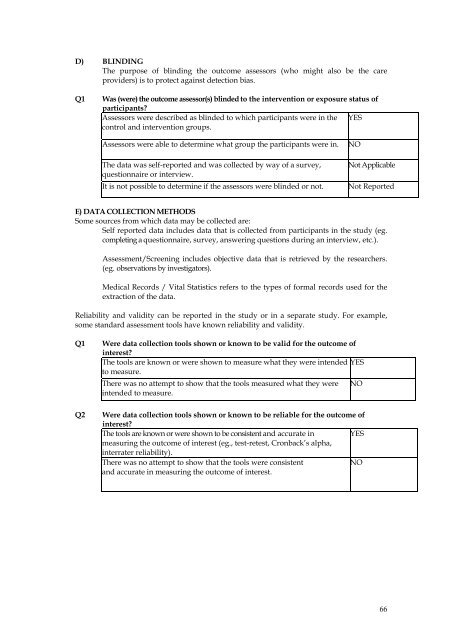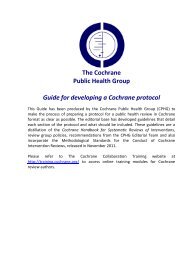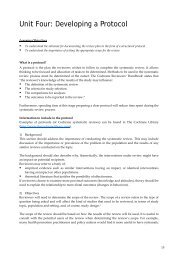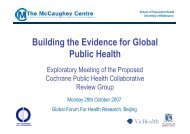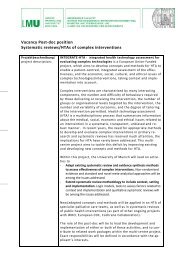Unit Eight: Principles of Critical Appraisal - Cochrane Public Health ...
Unit Eight: Principles of Critical Appraisal - Cochrane Public Health ...
Unit Eight: Principles of Critical Appraisal - Cochrane Public Health ...
You also want an ePaper? Increase the reach of your titles
YUMPU automatically turns print PDFs into web optimized ePapers that Google loves.
D) BLINDING<br />
The purpose <strong>of</strong> blinding the outcome assessors (who might also be the care<br />
providers) is to protect against detection bias.<br />
Q1<br />
Was (were) the outcome assessor(s) blinded to the intervention or exposure status <strong>of</strong><br />
participants?<br />
Assessors were described as blinded to which participants were in the YES<br />
control and intervention groups.<br />
Assessors were able to determine what group the participants were in.<br />
The data was self-reported and was collected by way <strong>of</strong> a survey,<br />
questionnaire or interview.<br />
It is not possible to determine if the assessors were blinded or not.<br />
NO<br />
Not Applicable<br />
Not Reported<br />
E) DATA COLLECTION METHODS<br />
Some sources from which data may be collected are:<br />
Self reported data includes data that is collected from participants in the study (eg.<br />
completing a questionnaire, survey, answering questions during an interview, etc.).<br />
Assessment/Screening includes objective data that is retrieved by the researchers.<br />
(eg. observations by investigators).<br />
Medical Records / Vital Statistics refers to the types <strong>of</strong> formal records used for the<br />
extraction <strong>of</strong> the data.<br />
Reliability and validity can be reported in the study or in a separate study. For example,<br />
some standard assessment tools have known reliability and validity.<br />
Q1<br />
Q2<br />
Were data collection tools shown or known to be valid for the outcome <strong>of</strong><br />
interest?<br />
The tools are known or were shown to measure what they were intended YES<br />
to measure.<br />
There was no attempt to show that the tools measured what they were<br />
intended to measure.<br />
Were data collection tools shown or known to be reliable for the outcome <strong>of</strong><br />
interest?<br />
The tools are known or were shown to be consistent and accurate in YES<br />
measuring the outcome <strong>of</strong> interest (eg., test-retest, Cronback’s alpha,<br />
interrater reliability).<br />
There was no attempt to show that the tools were consistent<br />
NO<br />
and accurate in measuring the outcome <strong>of</strong> interest.<br />
NO<br />
66


